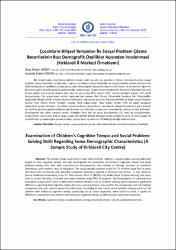Çocukların Bilişsel Tempoları İle Sosyal Problem Çözme Becerilerinin Bazı Demografik Özellikler Açısından İncelenmesi (Kırklareli İl Merkezi Örneklemi)
Özet
Araştırmada, okul öncesi eğitime devam eden beş-altı yaş çocukların bilişsel tempolarına göre sosyal problem çözme becerileri incelenmiştir. Ayrıca, çocukların bilişsel tempoları ve sosyal problem çözme becerilerinin kültürel-toplumsal özellikleri, kardeş sayısı, okul öncesi eğitim kurumuna devam etme süresi ve annelerinin öğrenim durumuna göre farklılık gösterip göstermediği incelenmiştir. Araştırmanın örneklemini Kırklareli il Merkez'inde okul öncesi eğitim kurumlarına devam eden beş-altı yaş grubu 49'u roman 126'sı roman olmayan toplam 175 çocuk oluşturmuştur. Bu araştırmada verileri toplamak için Kansas Okul Öncesi Dönemdeki Çocuklar İçin Düşünsellik-İçtepisellik Ölçeği (KRISP) A formu (Kansas Reflection- Impulsivity Scale for Preschool KRISP) ve Wally Sosyal Problem Çözme Testi (Wally Social Problem Solving Test) kullanılmıştır. Elde edilen veriler SPSS 20 paket programı kullanılarak analiz edilmiştir. Çocukların sosyal problem çözme beceri puanlarının bilişsel tempolarına göre anlamlı bir farklılık gösterip göstermediğinin belirlenmesi için öncelikle varyansların homojenliği Levene ile test edilmiştir. Karşılaştırma tek yönlü varyans analizi, farklılığın testi için de çoklu karşılaştırma LSD testi ile hesaplanmıştır. Araştırmanın sonucunda, hızlı ve doğru yapan ile reflektif bilişsel tempoya sahip çocukların yavaş ve yanlış yapan ile impulsif olan çocuklara göre sosyal problem çözme beceri puanlarının farklılık gösterdiği belirlenmiştir. The present study examined 5-6 year-old preschool children's social problem-solving skills with regard to their cognitive tempo. We also investigated the association of children's cognitive tempo and social problem-solving skills with their cultural-social characteristics, the number of siblings, duration of preschool attendance, and mothers' level of education. The study sample included a total of 175 children aged five-six years (49 Roma-126 non-Roma), who attended preschool institutions located in Kırklareli City Centre. In this research, Kansas Reflection-Impulsivity Scale for Preschoolers Form A (KRISP) and Wally Social Problem-Solving Test were used to collect the data. Collected data were analyzed using SPSS 20 program. The homogeneity of variances was evaluated using Levene's test to determine whether children's social problem-solving scores showed a significant difference regarding their cognitive styles. One-way variance analysis was used for the comparison and LSD multiple comparison test was used to assess the differences. According to the results, social problem-solving scores of the children with reflective cognitive tempo, producing fast-accurate responses, were found to show a significant difference compared to the children with impulsive cognitive tempo, producing slow-inaccurate responses.
Kaynak
Bartın Üniversitesi Eğitim Fakültesi DergisiCilt
4Sayı
2Bağlantı
https://app.trdizin.gov.tr/makale/TVRrMU1ESXdNQT09https://hdl.handle.net/20.500.11857/1756
Koleksiyonlar
- Makale Koleksiyonu [624]
- TR-Dizin İndeksli Yayınlar Koleksiyonu [1037]



















